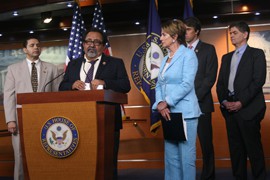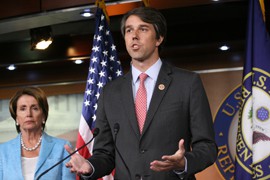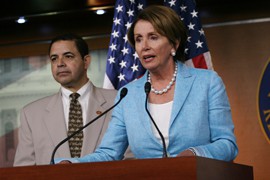Cronkite News has moved to a new home at cronkitenews.azpbs.org. Use this site to search archives from 2011 to May 2015. You can search the new site for current stories.
Democrats push as GOP weighs next steps on immigration reform
WASHINGTON – House Republican leaders reaffirmed their stance Wednesday against a comprehensive immigration reform bill like the one passed last month by the Senate, insisting that they will focus on smaller, separate measures instead.
The announcement came as Democrats on Capitol Hill and in the White House renewed the call for House leaders to have the “courage” to take up a bipartisan and comprehensive reform plan.
President Barack Obama met with members of the Congressional Hispanic Caucus to talk about the issue Wednesday. White House spokesman Jay Carney said in an afternoon briefing that that while passing comprehensive immigration reform will be an “uphill battle,” there is greater momentum for immigration reform.
The GOP statement came after House Republicans met behind closed doors late Wednesday afternoon to talk about the next steps on immigration reform. In a joint statement from House leaders after that meeting, they said the House would continue its own approach to immigration reform instead of taking up the Senate bill.
“Today, House Republicans affirmed that rather than take up the flawed legislation rushed through the Senate, House committees will continue their work on a step-by-step, commonsense approach to fixing what has long been a broken system,” said the statement from House Speaker John Boehner’s office.
Republicans in the Arizona delegation did not immediately return calls Wednesday about the next steps for immigration reform in the House.
But Democratic members of the Border Caucus insisted that a comprehensive bill would be better than a piecemeal approach on economic, humanitarian and other fronts.
Rep. Raul Grijalva, D-Tucson, one of the Hispanic Caucus members who met with Obama earlier Wednesday, said a necessary component of comprehensive immigration reform is a pathway to citizenship and an emphasis on humanitarian efforts.
Grijalva said more than 5,700 people have died along the border in the last 10 years, 2,700 in Arizona alone. That calls for humanitarian efforts, like targeting human trafficking, he said.
Border Caucus members stressed the economic advantages of comprehensive reform, and the president did likewise in his meeting with Hispanic lawmakers, pointing to a July report on the economic benefits of fixing the immigration system.
“It’s about border security, but it’s also about economic security,” House Minority Leader Nancy Pelosi said at the Border Caucus event.
Six million American jobs depend on trade from Mexico, which is the nation’s third-largest trading partner, said Rep. Filemon Vela, D-Texas.
“The symbolic nature of constructing more fence along the border of a country with whom we have such great business relationships doesn’t make any sense,” Vela said.
But amendments to the Senate bill call for $40 billion in border-security improvements, including the addition of 18,000 Border Patrol agents and 700 miles of new fence.
Rep. Beto O’Rourke, D-Texas, said the House should take some of that $40 billion and redirect it to to economic growth and trade. Doing so would create jobs and generate billions of dollars in economic activity, he said.
“And really at the end of the day, Republican or Democrat, that’s why we’re here – to create jobs, to create opportunities, to create economic growth,” O’Rourke said.
Democrats agreed with Carney that there is some momentum behind reform efforts. It’s time for the House to to continue that momentum in a bipartisan manner, they said.
“Two weeks ago the Senate passed a bipartisan bill,” Pelosi said. “We hope now that the House will act, again in a bipartisan way.”









